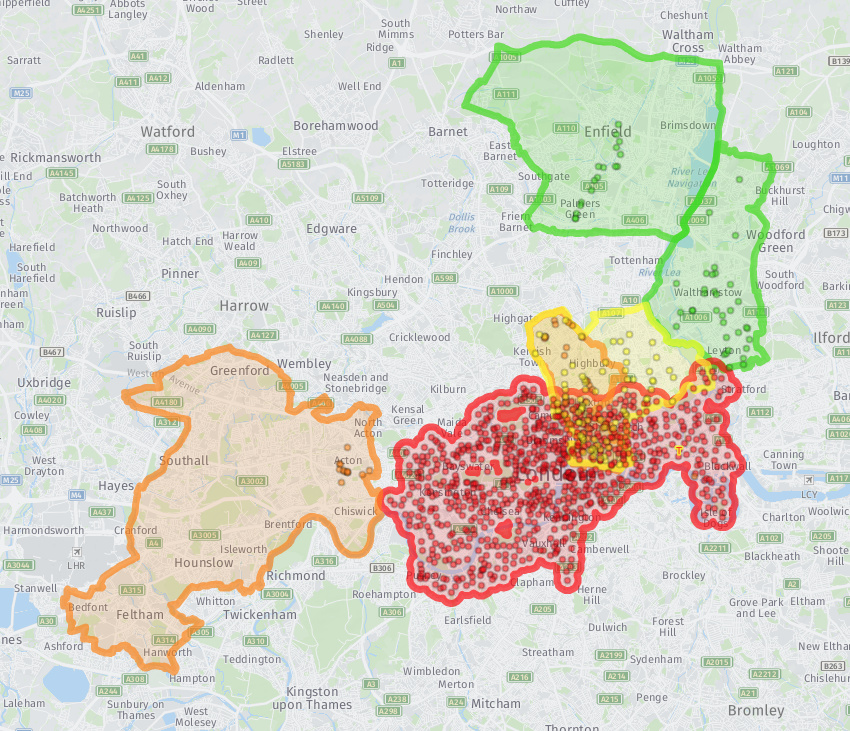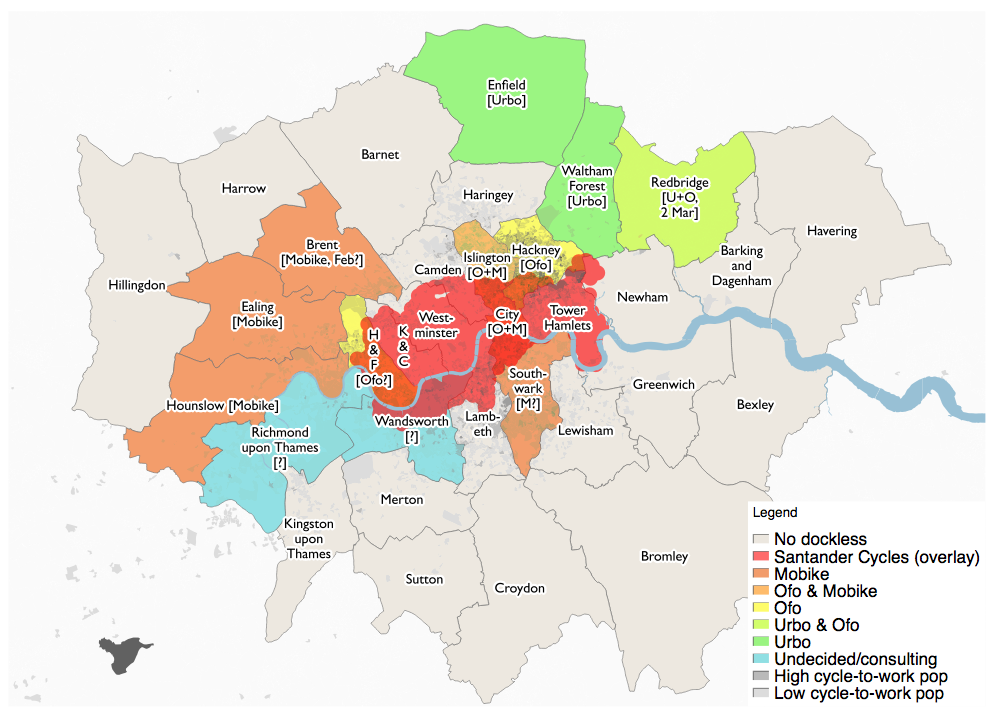
Future Transport Report and Dockless in London

The GLA published an interesting report last week: Future transport – How is London responding to technological innovation. It focused mainly on drones, driverless cars and app-based services (as an example, CityMapper’s experimenting on turning its huge desire-line dataset, created from the data of its millions of users and their journeys, into a group-based taxishare service), but also included some details on bikeshare, and in particular the dockless “revolution” that is currently underway in the capital.
Some tidbits from the report include a admission from Transport for London regarding the Santander Cycles dock-based bikeshare system – “The scheme is also limited geographically to central London, with TfL having no plans to extend it.” Well, that’s a pity, but not entirely surprising – TfL is still subsidising the system by over £3m a year (too much “dumb” redistribution going on is likely a large part of this. Incentivise users to do their own distribution for small rewards – much cheaper!)
One important point from the report is suggesting that TfL should take the lead in regulating and so controlling the provision of dockless bikeshare systems on London streets, instead of the individual boroughs as present. This is an “obvious” thing to do – it is time consuming and inefficient for each operator to, assuming that they want a pan-London rollout, have 33 sets of negotiations with the 32 separate borough councils and the City of London, when much of London’s other transport operations are specified, operated or regulated by one entity – Transport for London. It also slows the rollout, makes the systems very expensive for operators to maintain if they are fragmented, particularly if each borough has slight differences in their specification (e.g. on maintenance response times). More importantly, it makes it less useful and more confusing for the user – both the start and the end of an intended journey need to be within an operating zone. Borough boundaries are somewhat arbitrary to most people living in London, and not easily noticed when crossing them. Coupled with the reluctance of many of the operators to even publish their operating zone except on their individual apps, makes discovering the allowable area of a system – let alone using it – a challenge. “London” is a more familiar area.
Curiously, a lot of the press leading from this report seemed to suggest that the recommendation of TfL taking on regulation of dockless bikeshare in London was in some way a clampdown on their operations, or a tightening of the environment. An odd, negative spin. It’s not that at all. Having TfL controlling dockless, rather than 33 geographically limited entities, can only be good for everyone concerned.
My own take is that TfL regulation would be welcomed, but it might be linked with an incorporation of data into TfL’s own open data platform. A smart city is an open city, one where availability data on useable assets in the public realm is accessible to all, not to those tied to a particular platform (even if the transaction part needs operator control) or hidden to hide poor public value for money or failing/missing assets, as is happening for a system in a certain city up north. There is a need to democratise the information, in order to digitise the city. To this mind, dockless operators should be mandated to open up data on the location of bikes available to hire, hubs (preferred parking areas) and operating zones. This kind of information has generally always been made available by dock-based systems, dockless systems have so far not been compelled to release this as open data yet – at least in the UK.
To this mind, I am planning shortly on launching an operator data openness dashboard for the UK – similar to one that was unveiled at a recent bikeshare hackathon event in Washington DC. I’ve also put together an interactive map showing the current coverage in London of the four active systems (Urbo, Ofo, Mobike and the dock-based Santander Cycles), plus known “hubs” where you are most likely to find bikes available for hire – N.B. not all the operators are using a hub-based approach across their whole areas. Because of the lack of open API data from most of the operators, much of this map is manually put together and so may be a little out of date – I will do my best to keep it current. The crucial data missing here of course is the current locations of bikes available to hire. For now, you’ll need to use each individual app.
Personally, I think that hub locations are one of the most important features of the new dockless systems. They can act as a point that is regularly stocked with bikes, meaning that regular users might not need to keep doing different journeys on foot to hunt down a bike. They also help the system keep order – they may help to minimise the amount of inconsiderate parking. Currently, the reward for finishing a journey at such a hub is minimal. Operators will have to be more ambitious if the hub-inducement model work. Something like halving the fee to finish a ride in a hub, and doubling it to finish a ride outside of an operating zone altogether. It should also be possible to have hubs outside of operating areas, for example, on specific pieces of private land where access has been granted, but the local authority has not granted permission.
Meanwhile, the borough-by-borough rollout of dockless in London continues. Wandsworth has a forthcoming pilot, and has published the responses to a questionnaire given to six potential operators. Nearby Richmond is also planning on trialing dockless “by April”. Redbridge is brining Ofo and Urbo in on 2 March. This will give Urbo a contiguous area across three north-east London boroughs, however all three are outer boroughs with generally lower existing cycling journeys or infrastructure than the inner city. Ofo was in to the eastern half of Camden last week, but then abruptly withdrew back to the Islington border. They are also strongly rumoured to be arriving in Hammersmith & Fulham, soon. Southwark is also bringing in bikeshare – Mobike are hinting it would be them, in March.

